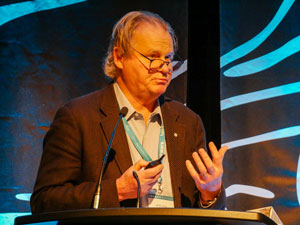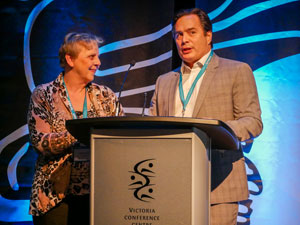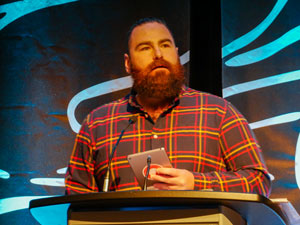
BACK TO THE FUTURE
Ancient cultures provide principles for travel sustainability

TED DAVIS
An understanding of ancient cultures and their concepts of environmental sustainability should be considered in solutions to the growing threat of climate change. That was one conclusion drawn from the recent IMPACT Sustainability Travel & Tourism Conference in Victoria, BC.

Keynote presenter Wade Davis speaks on the theme, A Reality Check for Biodiversity during the IMPACT conference
It was convened to seek solutions to the ongoing climate emergency, which is an increasing concern for stakeholders in the travel and tourism industries. Empathy for the natural world, and the role of humanity, was the essence of the messaging by some of the speakers at the conference, which took place at the Victoria Convention Centre in late January.
One of those bringing this perspective was UBC professor of anthropology Wade Davis, who used his cultural knowledge to illustrate how ancient principles had been replaced by more modern, industrial age priorities. A lack of memory capacity is a key culprit to this progression, said Davis, who is a National Geographic explorer, author and photographer specializing in Indigenous cultures.
That is, after a certain period of time, key historical events fade in relevance within the collective human memory said Davis. “It’s a haunting trait of humanity that may ultimately lead to our destruction,” said the UBC professor. His was just one in a busy schedule of presentations at the IMPACT gathering, which was in its third year of operation.
Indigenous directions
The presence of First Nations’ tourism enterprises and interests at the IMPACT conference achieved an even deeper significance, as their own ancient principles of sustainability were aligned with those defined by Davis.

Marion Joppe, a professor at the School of Hospitality, Food and Tourism Management, University of Guelph, was the co-chair of the IMPACT Sustainability Travel & Tourism Conference, together with Keith Henry, president and CEO of the Indigenous Tourism Association of Canada.
Given the dominance of a Western outlook, it will be necessary to adopt a view of the world that is more First Nations in nature.
“We have to turn to the Indigenous cultures and recognize that there is another way,” said Davis. Davis got maybe the biggest round of applause from the audience at IMPACT.
Keith Henry, president and CEO of the Indigenous Tourism Association of Canada (ITAC), maintained the Indigenous messaging throughout conference as not only a host and speaker, but also a conference organizer. For instance, he told conference delegates that commercial sport fishing was depleting salmon reserves and that some lodges with First Nations ownership on the BC west coast – including Haida Gwaii – had stopped offering sport fishing as an activity to its guests.
“The local tourism benefits are disappearing for Indigenous communities. More investment is needed to ensure benefits, like jobs and community development. We are facing huge challenges,” said Henry.
Sustainability above
Taking these principles to heart was a comprehensive lineup of industry experts and stakeholders who spoke during the three days of IMPACT.

Charlotte Bell, president of the Tourism Industry Association of Canada (r), makes a point during a panel discussion on the Canadian tourism state of the industry. She was joined by (l-r) Keith Henry, CEO of the Indigenous Tourism Association of Canada; Katie Briscoe, president of MMGY Global; and Gloria Loree, chief marketing officer for Destination Canada.
For instance, executives from the commercial airline sector took the stage at the Victoria Conference Centre to describe the changing landscape, and how they are adapting – and in some cases taking advantage of these changes. Key to that is in recognizing that new environmental demands and expectations present business opportunities.
For instance, Geoff Tauvette, the director of environment and fuel for WestJet, said that fuel-burning efficiencies had advanced in great leaps, and that fuel efficiency had grown by about 50% since year 2000. “Jet engines are three times more efficient than (gas burning) cars,” said Tauvette. “But we have to do a better job of telling our story.”
For example, Douglas Shelton, the global account manager for Cathay Pacific Airways, noted the largely unpublicized story of how Cathay is a buyer of a new low carbon bioenergy fuel called Fulcrum Fuel. It is based on waste and was developed in Nevada. “We are buying a million tons of this fuel,” he said.
Both airline execs agreed that the challenges are having more of a presence in Europe, where the new term “flight shaming” was coined by climate activist Greta Thunberg. And they pointed to recent media reports describing how flight shaming was starting to impact bookings by some European airlines.
For example, Scandinavian airline SAS says its passenger numbers for travel within Sweden are declining, and it attributes this recent trend to flight shaming. SK, the country’s main train operator, said it sold 1.5 million more tickets in 2018 than in the previous year, due to the “Greta effect.”
Efforts at sea
As a growing port of call for cruise ships, Victoria served as an ideal city venue for the IMPACT conference. Concerns for the effects that the cruise ship industry is having on the environment – and solutions to counter those effects – were tabled at a panel discussion staffed by cruise sector stakeholders. They considered facts like there were 17.8 million cruise ship passengers worldwide in 2009, and that this will reach 32 million in 2020.
“The expansion of the cruise ship industry has been the story of the past decade,” said Nick Rose, director of environmental programs for Royal Caribbean Cruises. “But the destinations and ports of call are what drives this growth. So it is not in our best interest to adversely impact those places.”
He pointed to signs of progress such as the integration of waste treatment systems in 90% of the world’s cruise ship fleet and reductions of about 20% in greenhouse gases by cruise ship power plants. But these are still carbon-based, so cruise ships have yet to achieve an acceptable carbon footprint, he said.
Even before the panel started, Victoria mayor Lisa Helps voiced her commitment to assemble investment support (including federal dollars) for electric shore power facilities. These will allow cruise ships to dock and “plug in” to giant power outlets at Victoria’s Breakwater District cruise ship terminal, thus eliminating the need for the ships to idle their engines to maintain power while in port. This will eliminate the pall of black smoke that hangs over the port when cruise ships are docked on windless days.
End game considerations

Leigh Barnes, the chief customer officer for Intrepid Travel, challenged the travel/tourism industry to make big changes.
Measures like these are just some of the many steps necessary in the face of a potentially difficult future for the travel and tourism industries. “There will be no reefs to dive on, no beaches to visit, and no ski fields if we continue on this same course,” said Leigh Barnes, the chief customer officer for Intrepid Travel.
The travel sector is responsible for generating about 8% of the world’s carbon emissions, said Barnes, but there are hopeful signs of progress. “Our company has been carbon neutral since 2010, and we haven’t gone broke. In fact, our business has been bolstered,” said Barnes. This fundamental shift in outlook is being adopted more widely by the travel industry, he said.
“Brands are even taking political action. That would have been unthinkable 15 years ago, but now companies are increasingly expected to speak out. They are realizing that there is no tourism business on a dead planet.”
